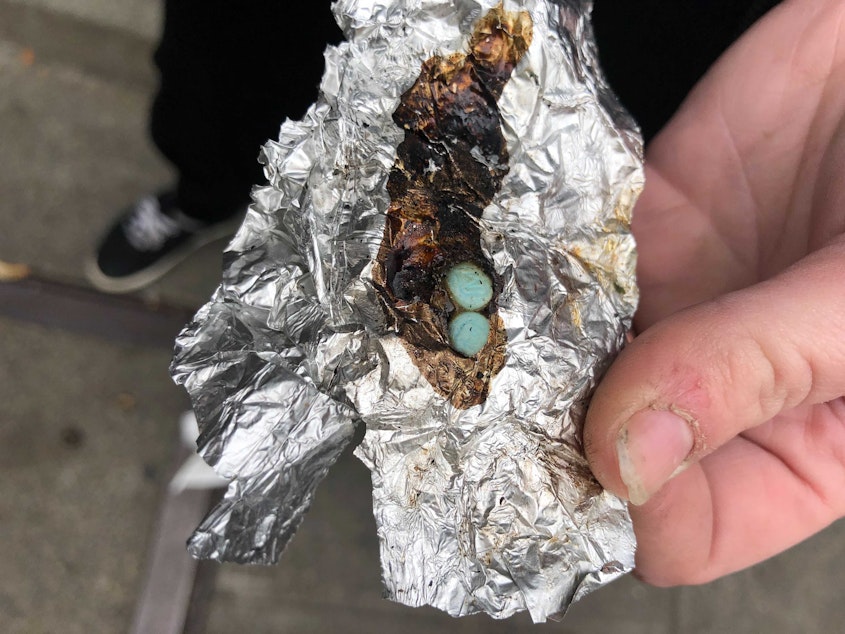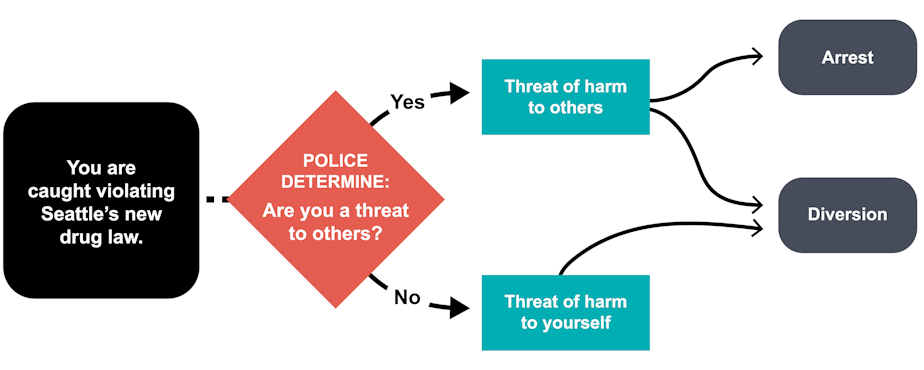Jail reserved for exceptional cases, as Seattle’s new drug law takes effect

Washington state drug laws have been in flux over the past year. During that time, a vanishingly small number of people were booked into King County Jail on low-level drug charges.
Now that a Seattle ordinance adopting new criminal penalties for drug possession and public use takes effect Friday, Oct. 20, jail officials predict an uptick in bookings. But Seattle officials say jail is still expected to remain a last resort.
These changes come as King County is setting a new record for drug overdose deaths.
The Seattle City Council approved the drug law – which codifies current state law and gives the city attorney the ability to prosecute drug possession cases -- in September, after a previous version failed to pass.
In making drug possession a gross misdemeanor, Mayor Bruce Harrell emphasized that police should consider arrests only when the person publicly using drugs presents a threat to others. He issued an executive order shortly after the new law passed, clarifying that officers can take into account the location where the person is using drugs, the type of drug (like fentanyl and meth) and the person’s physical condition.
Both the state and city laws emphasize that directing people to treatment and services is the preferred response. But Harrell's order said jail booking and referral for prosecution "are warranted in some situations."
In the past year, King County jails saw only three bookings that were primarily for misdemeanor drug charges. That's out of the more than than 15,000 jail bookings during that time, according to figures shared with KUOW by the county's Department of Adult and Juvenile Detention.
As the new law takes effect, a spokesperson for the Seattle City Attorney's Office said officials are trying to "manage expectations," given current constraints around jail bookings in King County. Misdemeanor bookings are generally restricted to people facing charges for assaults, domestic violence and impaired driving.
Sponsored
"[The Seattle Police Department] does not plan to book anybody for simple drug possession," the spokesperson said. They added that someone contacted by police for public drug use "may be booked into jail if they have also committed a companion crime" such as burglary or a firearms violation while possessing drugs.
But the spokesperson said the protocol under the mayor's plan involves giving people 30 days to engage in diversion programs, which provide case management, legal assistance, and help obtaining medically assisted drug treatment and permanent housing. If people decline to engage in treatment or services, then the Seattle City Attorney's Office could move forward to file the case.
SPD Deputy Chief Eric Barden confirmed that protocol in an interview with KUOW, saying Seattle police "have no intention of trying" to book anyone into jail solely on a charge for drug possession or public use. However he said those people who repeatedly opt for referrals to services and then continue to violate the ordinance may face charges eventually.
SPD distributed fliers notifying people about the new law on Oct. 20 and later in the day announced about two dozen arrests in two hotspots for public drug use: 12th Ave South & Jackson, and Third & Pike downtown. Barden said about 10 of those people were ultimately discovered to have felony warrants for assault, rape and other offenses and were booked into jail. He said 13 people accepted referrals to case workers. And two or three people declined services and were released; he said paperwork in their cases will be forwarded to the City Attorney's Office.

In a statement, Harrell's spokesperson Jamie Housen emphasized this approach under the new law, saying, "In most situations, when officers have probable cause to arrest someone for violating this ordinance, they will take the offender to a nearby police precinct and introduce them to a case manager."
Sponsored
Housen added, "As the mayor has said many times, these drugs are killing people, causing harm, and creating unsafe conditions across Seattle."
"The city is committed to diversion and treatment as the preferred response to help people struggling with addiction but is also prepared to take action to hold those causing the most harm accountable and ensure that everyone feels safe in Seattle."
While the City Attorney's Office signaled that police have no intention of seeking to book people into jail solely on drug possession and public use charges, the Department of Adult and Juvenile Detention said in a statement Thursday that people arrested under Seattle’s new law are eligible to be booked into jail if they are deemed a public safety threat.
"While we anticipate an increase in jail bookings from this new ordinance, based on experience we also expect the courts will grant many individuals pre-trial release," the statement read.
“It must be said that jail is not the right place for people who are addicted to drugs," the statement added. "DAJD is committed to the alternatives to incarceration and treatment identified in the ordinance and in state law, as incarceration has been proven to be an ineffective approach to aiding those suffering from substance use disorder."
Sponsored
Jail bookings on drug offenses were exceedingly rare in King County over the past year, a DAJD spokesperson said. In the 12 months that ended September 30, 2023, “there have been three bookings where a misdemeanor drug charge was the most serious offense at booking." Police in Bothell, Redmond, and Seattle each booked one of those cases, the spokesperson added. During that same period, there were 15,067 total bookings in that time, per the spokesperson.
As part of the city's new law, Seattle police are required to track the number of arrests and referrals over the next year.
Lisa Daugaard is the co-executive director for the nonprofit Purpose Dignity Action, which serves as project manager for the LEAD diversion efforts that will encounter most people affected by the new law. She said, “under the [Seattle police] policy guidance, there is a very strong presumption of pre-booking diversion of these charges, without there being an absolute prohibition on booking.”
She said she would not expect to see Seattle police seeking to book people into jail on drug possession charges unless they are ineligible for diversion “due to specific, limited, recent, violent criminal history.”
In his proposed 2024 budget Mayor Harrell has proposed $17 million in funding for diversion programs, which Daugaard said is slightly less than this year’s funding.
Sponsored
However, Daugaard said, Seattle police expect to make between 700 and 800 referrals a year under the new law, and that may require "mid-year supplemental budget adds next year” for diversion programs. She said she anticipates that Harrell will seek that supplemental funding if needed.
The spokesperson for the City Attorney's Office said "nobody knows" how many cases to anticipate under the new law, in addition to the roughly 10,000 cases referred from Seattle police for prosecution. But if the number is significant, that office could also seek supplemental funding in 2024.
Update 10/26/2023: This story has been updated to include additional information from the Seattle Police Department.


